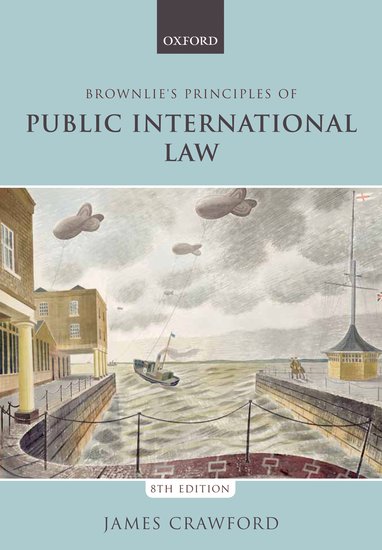With the situation in Crimea moving rapidly, our law editors recently put together a debate map on the potential use of force in international law. To further support the background reading that many students and scholars of international law need, we’ve compiled a brief reading list to better understand the context and application of international law, including concepts of sovereignty, international responsibility, the laws of war, self-determination, secession, and statehood.
Brownlie’s Principles of Public International Law, Eighth Edition by James Crawford
Check Part III: Territorial Sovereignty, Part VI: International Transactions, Part IX: The Law of Responsibility, and Part XI: Disputes for overviews of the major issues in the Crimea crisis. Identify the different elements of the public international law system at play.
Documents on the Laws of War, Third Edition, edited by Adam Roberts and Richard Guelff
Review the core rules, protocols, and conventions governing rights, duties, protections, and applications in wartime. What guidance can they provide?
The Law of International Responsibility, edited by James Crawford, Alain Pellet, and Simon Olleson; assistant editor Dr Kate Parlett
With discussion in Europe and the United States about their obligations to Ukraine, it’s essential to understand what protections there are to offer – and what qualifications must be met before enforcement.
Contested Statehood: Kosovo’s Struggle for Independence by Marc Weller
What can we learn from the international attempts to settle the Kosovo crisis and apply these lessons to Crimea? What failures can be avoided?
The Foreign Policy of Counter Secession: Preventing the Recognition of Contested States by James Ker-Lindsay
Gain insight from interviews with leading experts on the territorial integrity of states versus the right to self-determination.
The War Report: 2012, edited by Stuart Casey-Maslen
Much of the actions that the international community may take are predicated on the definition of war — or at least aggressive action. If Crimea doesn’t undergo a seamless transition, will this conflict be included the the 2014 war report?
Robert Beck on Grenada and Georg Nolte on Intervention by Invitation from Wolfrum (Ed.) in The Max Planck Encyclopedia of Public International Law
Crimea has voted for annexation and invited Russia into the country. What lessons can be drawn from Grenada 1983?

Louise Doswald Beck’s “The Legal Validity of Military Intervention by Invitation of the Government” in The British Year Book of International Law
While scholars debate the meanings of the basic theoretical principles of international law, how do they compare to historical interventions?
Two approaches to South Ossetia: Philip Leach from Wilmshurst (Ed.) The Classification of Conflicts and Angelika Nussberger from Wolfrum (Ed.) The Max Planck Encyclopedia of Public International Law
In 2008, tensions between Georgia and Russia spilled over into an armed conflict. Are there lessons for Russia’s conduct — as well as the international community’s — for today?
Georg Nolte and Albrecht Randelzhofer on Article 51 from Simma (Ed.) The Charter of the United Nations: A Commentary
There is no doubt the UN Charter will be invoked in the debates, so clear commentary is crucial to understanding it.
Both Stefan Oeter and Daniel Thurer on Self-Determination
If the people of Crimea choose to join Russia, who is the international community to stop them?
James Crawford on Secession from The Creation of States in International Law, Second Edition
What are the tests for international recognition now that Crimea has seceded?
Yves Beigbeder on Referendum from Wolfrum (Ed.) The Max Planck Encyclopedia of Public International Law
There have been a number of disputes over Crimea’s referendum — from lack of choice to intimidation at the polling stations.
Jens Ohlin on Aggression from Cassese (Ed.) The Oxford Companion to International Criminal Justice
Shots have been fired. If the conflict escalates, how and when does it qualify as aggression under international law?
Proportionality in International Law by Michael Newton and Larry May
With periodic incidents of violence and many military and civilian actors and targets in play around Crimea and at the Ukraine border, it’s important to understand whom can be targeted and with what level of force.
Point of Attack: Preventive War, International Law, and Global Welfare by John Yoo
Does the UN system and international law in general act to unreasonably constrain states from intervening in international crises for reasons of general humanitarian concerns? Can Russia’s intervention into Crimea be justified on humanitarian grounds?
Russia, the West, and Military Intervention by Roy Allison
Russia has intervened in a number of international conflicts in the last 25 years; does Russia’s intervention into Crimea fall into a pattern regarding Russia’s relationship with former Soviet states on its periphery? How can we understand Russian political and diplomatic responses during international crises around major interventions?
Oxford University Press is a leading publisher in international law, including the Max Planck Encyclopedia of Public International Law, latest titles from thought leaders in the field, and a wide range of law journals and online products. We publish original works across key areas of study, from humanitarian to international economic to environmental law, developing outstanding resources to support students, scholars, and practitioners worldwide. For the latest news, commentary, and insights follow the International Law team on Twitter @OUPIntLaw.
Subscribe to the OUPblog via email or RSS.
Subscribe to only law articles on the OUPblog via email or RSS.



[…] the ongoing standoff between Ukrainian and Russian forces over the Crimean peninsula, the Oxford University Press’s blog has a handy-dandy reading list to help brush up your knowledge on international law. All signs point towards Russia breaching […]
[…] the Russian ‘spring’ of 2014 gained momentum, our law editors pulled together a debate map on the potential use of force in international law focused on the situation in Crimea. We also heard expert analysis from Sascha-Dominik Bachmann on […]